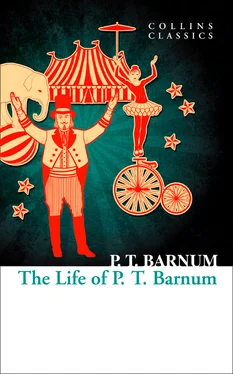1 ...8 9 10 12 13 14 ...29 “He is a wide-awake eunning fellow, one whom I should be sorry to offend, for I would not like to fall into his clutches; but if compelled to do so, I could divulge some things which would astonish our Consociation.”
“Is it possible? Well, of course your duty to the Church and the Redeemer’s cause will prompt you to make a clean breast of it, and divulge every thing you know against the accused,” responded the excited clergyman.
“It is hard to destroy a brother’s reputation and break up the peace of his family,” answered the meek Mr. Richard.
“It is the duty of the elect to expose and punish the reprobates,” replied the sturdy Puritan.
“But had I not better first tell our brother his fault, and give him an opportunity to confess and be forgiven?”
“Our brother, as you call him, is undoubtedly a heretic, and the true faith is wounded by his presence amongst us. The Church must be purged from unbelief. We must beware of those who would introduce damnable heresies.”
“Are you sure that Mr. Dey is an unbeliever?” inquired the modest Mr. Richard.
“I have heard that he throws doubt upon the Trinity – shrugs his shoulders at some portions of the Saybrook Platform, and has said that even reprobates may sincerely repent, pray for forgiveness, and be saved. Ay, that he even doubts the damnation of unregenerate infants!”
“Horrible!” ejaculated Mr. Richard.
“Yes! Horrible indeed, but I trust that our Consociation will excommunicate him at once and for ever. But what do you know concerning his belief?”
“I know nothing specially against his belief ,” responded Mr. Richard, “but I have witnessed some of his acts which I should be almost sorry to expose.”
“A mistaken charity! It is your duty to tell the Consociation all you know regarding the culprit, and I shall insist upon your doing so.”
“I certainly desire to do that which is right and just, and as I am but young in the ministry I shall defer to your judgment founded on age and experience. But I would prefer at first to state to you what I know, and then will be guided by your advice in regard to giving my testimony before the Consociation.”
“A very proper course. You can state the facts to me, and I will give you my counsel. Now what do you know?”
“I know that on more than one occasion I have caught him in the act of kissing my wife,” replied the injured Mr. Richard.
“I am not at all astonished,” responded the clergyman; “such conduct coincides exactly with the opinion I had formed of the man. I commiserate you, sir, but I honor your sense of duty in divulging such important facts, even at the expense of exposing serious troubles in your domestic relations. But, sir, justice must have its course. These facts must be testified to before the Consociation. Do you know any thing else against the delinquent?”
“I know something more, but it is of a nature so delicate, and concerns me personally so seriously, that I must decline divulging it.”
“Sir, you cannot do that. I will not permit it, but will insist on your telling the whole truth before our Consociation, though your heart-strings were to break in consequence. I repeat, sir, that I sympathize with you personally, but personal feelings must be swallowed up in the promotion of public good. No sympathy for an individual can be permitted to clash with the interests of the true Church. You had better tell me, sir, all you know.”
“Since you say that duty requires it, I will do so. I have caught him, under very suspicious circumstances, in my wife’s bedroom,” said the unfortunate Mr. Richard.
“Was your wife in bed?” inquired the man with the iron face.
“She was,” faintly lisped the almost swooning Mr. Richard.
“Enough, enough,” was the response. “Our Consociation will soon dispose of the Rev. Richard V. Dey.”
The two clergymen had now arrived at Middletown. The Rev. Mr. Vinegarface rode to the parsonage, while Mr. Dey, alias “Mr. Richard,” went to a small and obscure inn.
The Consociation commenced the next day. This ecclesiastical body was soon organized, and after disposing of several minor questions, it was proposed to take up the charges of heresy against the Rev. Mr. Dey. The accused, with a most demure countenance, was conversing with his quondam travelling companion of the day previous, who upon hearing this proposition instantly sprang to his feet, and informed the Reverend Chairman that providentially he had been put in possession of facts which must necessarily result in the immediate expulsion of the culprit from the Church, and save the necessity of examining testimony on the question of heresy. “In fact,” continued he, “I am prepared to prove that the Rev. Richard V. Dey has frequently kissed the wife of one of our brethren, and has also been caught in a situation which affords strong evidence of his being guilty of the crime of adultery!”
A thrill of horror and surprise ran through the assembly. Every eye was turned to Mr. Dey, who was seated so closely to the last speaker that he touched him as he resumed his seat. Mr. Dey’s countenance was as placid as a May morning, and it required keen vision to detect the lurking smile of satisfaction that peeped from a corner of his eye. A few minutes of dead silence elapsed.
“Produce your witnesses,” finally said the Chairman, in an almost sepulchral voice.
“I call on the Rev. Mr. Richard, of Fairfield, to corroborate under oath the charges which I have made,” responded the hard-visaged Puritan.
Not a person moved. Mr. Dey looked as unconcerned as if he was an utter stranger to all present, and understood not the language which they were speaking.
“Where is the Rev. Mr. Richard?” inquired the venerable Chairman.
“Here he is,” responded the accuser, familiarly tapping Mr. Dey on the shoulder.
The whole audience burst into such a roar of laughter as probably never was heard in a like Consociation before.
The accuser was almost petrified with astonishment at such inconceivable conduct on the part of that sedate religious assembly.
Mr. Dey alone maintained the utmost gravity.
“That, sir, is the Rev. Richard V. Dey ,” replied the Chairman when order was restored.
The look of utter dismay which instantly marked the countenance of the accuser threw the assembly into another convulsion of laughter, during which Mr. Dey’s victim withdrew and was not seen again in Middletown. The charges of heresy were then brought forward. After a brief investigation they were dismissed for want of proof, and Mr. Dey returned to Greenfield triumphant.
I have often heard Mr. Dey relate the following anecdote. A young couple called on him one day at his house in Greenfield. They informed him that they were from the southern portion of the State, and desired to be married. They were well dressed, made considerable display of jewelry, and altogether wore an air of respectability. Mr. Dey felt confident that all was right, and calling in several witnesses, he proceeded to unite them in the holy bonds of wedlock.
After the ceremonies were concluded, Mr. Dey invited the happy pair (as was usual in those days) to partake of some cake and wine. They thus spent a social half-hour together, and on rising to depart the bridegroom handed Mr. Dey a twenty-dollar bank note, remarking that this was the smallest bill he had, but if he would be so good as to pay their hotel bill (they had merely dined and fed their horse at the hotel) he could retain the balance of the money for his services. Mr. Dey thanked him for his liberality, and proceeded at once to the hotel with the lady and gentleman and informed the landlord that he would settle their bill. They proceeded on their journey, and the next day it was discovered that the bank note was a counterfeit, and that Mr. Dey had to pay nearly three dollars for the privilege of marrying this loving couple!
Читать дальше












